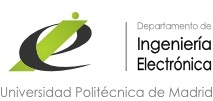Electronic Systems Laboratory (LSE 2)
1. Apply the basic principles of operation of the supporting technologies or applications based on intelligent systems.
2. Explain some of the technologies, systems or tools currently available as their strengths and weaknesses in detail.
3. Design, implement and evaluate a system, circuit or device related to technologies and applications for intelligent environments.
4. The ability to work together, collaborating on all aspects of project development.
The credits distribution involved in the subject depends on the progress of work and the needs of the group during the same, giving a greater emphasis on those concepts that specific students each year are less prepared. The topics covered in the course are:
- Design of the system architecture and design of interfaces between modules
- Development of an automated testing infrastructure
- Teamwork: share (repository), communicate and control (measure)
- Development of sensors and actuators
- Debugging systems development
- Programming of Microcontrollers with no operating system.
- Programming controllers for Linux
- Communication protocol between systems based on microcontroller
- Development of electronic systems applications over real-time requirements.
Teaching Methodology
Apply the principles of PBL in two possible meanings: "Project Based Learning" and "Problems Based Learning". Skills are acquired through the development of a team project related to the technologies and applications of electronic systems and embedded systems which try to highlight the problems faced by designers of electronic systems before explaining the solutions have been developed to solve them. Thus, the student who found the problem and has been in first person, is better and more motivated the teacher's explanation. Class attendance is mandatory and the course is mainly practical, supplemented with some fixed master classes and other on demand, depending on the group's evolution. The project used as main platform Raspberry Pi, following the work done in the course Embedded Systems. Additionally other microcontrollers will be used to implement external modules (PIC, AVR, ...). To guide students in the realization of the project the figure of the Guardian, who is a teacher with extensive experience in the topics covered, which proposes specific tasks and performs consulting work to develop skills in communication and integration teams.
The project is divided into tasks assigned to team members in pairs at each iteration (between 1 and 2 weeks). The couples will be adjusted at each iteration so that there is interaction between all team members. The development of the course work required by students outside the classroom schedule, which may assist the laboratory in its opening hours.
The feedback on the development of the project and how work will be done in iterations. Students may request tutoring for more feedback on the development of the project details, such as code structuring or adequacy of certain modules.
The evaluation was divided into 3 groups:
- Evaluation by peers, as members of a working group to jointly develop a project (20%)
- Evaluation by teachers (40%)
- Evaluation of the project as a group (40%)
Again, try to play as much as possible the real working environment that will face the student, which will be judged by his colleagues, by their bosses and customers.
In each iteration the team must present the work done and decisions made in the course of the iteration. It will present a technical report describing the system. The evaluation of the iteration will consider the system developed, the quality of development and report.
The final iteration will have a special value and will be presented on the final exam. Complete system is presented and delivered a final report, which will integrate the reports that have been presented in each iteration.
The final grade for the course will be half enters the final score and the median obtained by the student in iterations. The final grade will be normalized according to the student who obtains the highest score in the development of the subject.

